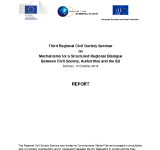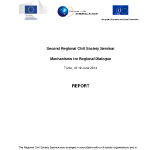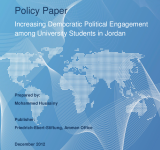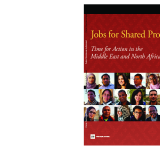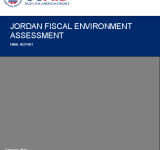dialogue
يتضمن هذا التقرير ملخص لندوة المنتدى الإقليمي للمجتمع المدني، بالاضافة إلى الملاحق التي تحتوي على تقارير لفرق العمل الثلاث التي قام المشاركين من المجتمع المدني بصياغتهم. لم ينوي التقرير لعكس جميع
يتضمن هذا التقرير ملخص لندوة المنتدى الإقليمي للمجتمع المدني، بالاضافة إلى الملاحق التي تحتوي على تقارير لفريقي العمل الذين قام المشاركين من المجتمع المدني بصياغتهم. لم ينوي التقرير لعكس جميع الجوانب
يتطرق هذا الفيديو إلى حق الطلبة في الجامعات الأردنية في بيئة تعليمية آمنة خالية من العنف, وذلك في ظل استمرار العنف والمشاجرات الجماعية داخل الحرم الجامعي.
The purpose of this paper is to examine the issues that are limiting the democratic perception of Jordanian university students' political engagement in university life. The paper defines this issue as being directly linked with both students' freedom and representative bodies. It offers a description of the historical and legal backgrounds associated with students' political participation in Jordanian universities;; and examines the core issues associated with students' political participation. This paper also categorizes the various problems that limit students' participation;; including intervention of security offices in student affairs;; the weakness of student clubs;; and the election mechanisms of student elections. This paper also discusses the absence of a student body that unifies various Jordanian universities;; disciplinary regulations;; university violence;; and the inability to students to express their political thoughts within the university.
Jobs are crucial for individual well-being. They provide a livelihood and;; equally important;; a sense of dignity. They are also crucial for collective well-being and economic growth. However;; the rules and the incentives that govern labor markets in MENA countries have led to inefficient and inequitable outcomes on the personal and collective standpoint. Several underlying distortions prevent a more productive use of human capital and have led to a widespread sense of unfairness and exclusion;; of which the Arab Spring was a powerful expression.
The assessment report is a final product of the Asia and Middle East Economic Growth Best Practices project (AMEG);; which is designed to support USAID missions in developing effective and efficient economic growth programs that address technical and strategic challenges. The report provides an introduction to Jordan's macroeconomic performance and structure and examines the field assessment's key lines of inquiry such as fiscal environment;; taxation;; customs and trade facilitation;; the energy sector;; policy analysis and political economic environment. It identifies the structure and performance of each inquiry and adds policy;; administrative;; and institutional environment;; and its challenges and opportunities.The report's concluding section outlines key challenges and opportunities;; and offers recommendations. Some of the findings include Jordan's lack of robust forum for soliciting and integrating input on economic policy issues from key stakeholders or the wider public and lack of institutional capacity to develop macroeconomic models. The report suggests facilitating national dialogue and consensus building on economic policy issues and building capacity to integrate stakeholder input.
